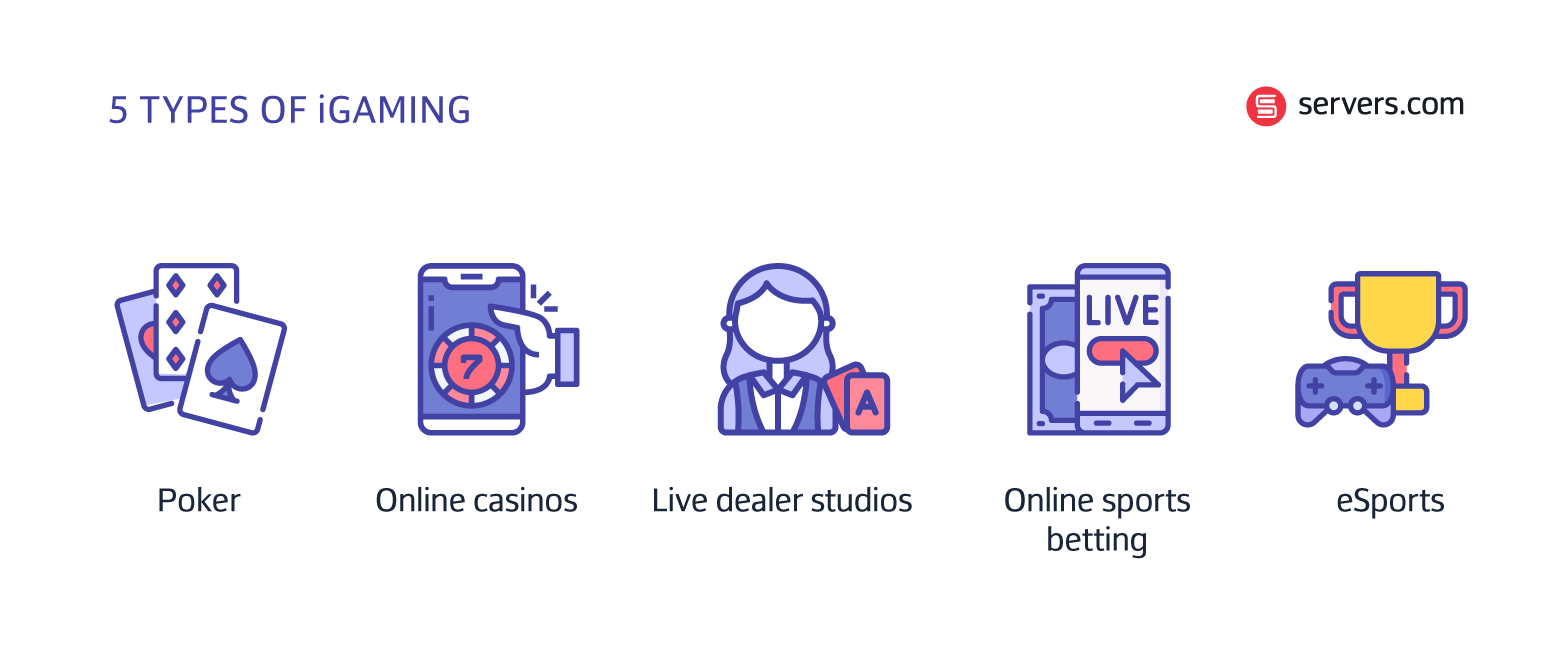

The iGaming industry is incredibly diverse. From online casinos and live dealer studios to online sports betting and eSports tournaments, iGaming platforms cater to every niche.
So, to better understand this vast industry, we’ve put together a one-stop guide to all things iGaming. Covering everything from what iGaming is and why it’s so popular through to the key infrastructure requirements platforms need to consider when hosting their iGaming applications.
In its narrowest sense, iGaming is defined as “online betting via electronic means”.
But, to define the iGaming industry in its entirety requires a broader definition. The iGaming industry isn’t only made up of online gambling platforms that end-users play on (operators like Poker Stars and Betway). It also includes B2B iGaming software suppliers like SOFTSWISS and BetConstruct that work behind the scenes to develop the game software for operators.
iGaming first emerged in 1994. Thanks to a surge in popularity of the internet, rapid development in iGaming technology, and the provision of iGaming server infrastructure, the market has grown dramatically in the last three decades.
Worldwide online gambling revenues are expected to reach $100.94 billion in 2024. And it’s expected to continue growing at an annual growth rate of 6.20% as iGaming technology continues to improve and more people look to gamble online.
These are some of the main drivers of iGaming’s increased popularity:
Because iGaming can be accessed via websites and apps, anyone with a device and an internet connection can play a few hands of poker or spin some slots.
The pandemic was also instrumental in driving growth as people looked for online alternatives while physical casinos were closed. 2021 was a record year for the iGaming industry in the US, with many states recording all-time revenue highs.
And it hasn’t stopped. According to The American Gaming Association (AGA), US gross gaming revenues reached all-time highs of $66.5 billion in 2023.
Post-pandemic, the accessibility of iGaming means it’s also beginning to take off in emerging markets. In Africa, for example, rising mobile phone ownership has driven uptake of online gambling and online gambling revenue on the continent is projected to reach $2.46 billion by 2049.
iGaming operators offer a range of deposit and withdrawal options. Users can choose to make debit or credit card payments, use eWallets, and it’s increasingly common to find iGaming platforms accepting decentralized currencies. Crypto payments have proven particularly popular due to their transparency, security, and the speed of transactions.
iGaming platforms today are extremely secure. Legitimate operators deploy strict security measures like SSL certification (digital certificates that authenticate a website’s identity) and know-your-customer (KYC) processes (checks to identify and verify account holders’ identities). These measures have helped to increase public trust in iGaming.
Technologies like virtual reality (VR) and augmented reality (AR) are bridging the gap between brick-and-mortar casino experiences and online gambling. The emergence of virtual casinos, where players can walk around virtual lobbies and interact with fellow patrons, is now giving users the chance to access real-life casino experiences from the comfort of their own homes.
Companies like TRIIONFT are now working to augment live casino experiences further by creating AI-powered software solutions for live casinos in the metaverse. And with Apple’s launch of its new augmented reality headset, Vision Pro, earlier in June, the possibilities for augmented iGaming experiences will no doubt continue to advance.
In the iGaming industry, proper regulation is make or break. Just like any land-based casino, iGaming activities fall under various regulatory jurisdictions. Those popular for iGaming include Malta, Curacao, Montenegro, Antigua and Barbuda, the Isle of Man, and the UK.
In the United States, where gambling has been heavily restricted for years, we’re starting to see more states voting to legalize and regulate online gambling. Online gambling is now legal in Nevada, New Jersey, Delaware, and Pennsylvania and other states including California, Indiana, and New York, all have bills under review.
The robust regulation of online casinos is serving to increase trust in online gambling operators. As a result, increasing the uptake of online gambling.

Online casinos provide digital versions of classic casino games and many also offer a wide selection of slot games. The rules and wagers are just like real-world gaming tables so there’s no additional learning curve for anyone used to traditional games.
In recent years, virtual reality casinos have also entered the scene offering even more life-like, interactive experiences to their users. In these VR environments users become immersed in real casino sounds, life-like casino rooms, 3D tables, and in-game chats to interact with other players in real-time.
The popularity of online poker within iGaming has exploded. The global online poker market is expected to reach a value of $193.8 billion by 2030. Online poker is extremely versatile, and players can choose between variants like straight, stud, draw, and flop, which can be played across various formats such as:
Live stream poker games
Online games optimized for web-browsers and/or mobile apps
Virtual games against computer-generated avatars
Online sports betting is one of the most accepted and widespread forms of gambling. It involves betting on the outcome of any real-world sporting event through online platforms. iGaming technology can facilitate a wide variety of wager options across different sports. With real-time updates, gamblers can even bet on events in-play (for example by predicting the final score).
And for those who like a riskier bet, accumulators offer opportunities to win big by stringing several predictions together as part of a single wager.
eSports involves video game players competing against one another (individually or as teams) in tournaments. The prizes at stake depend on the scale of the tournaments: professional gamers typically compete for huge prize pools (often hundreds of thousands of dollars, if not more). But there are also many amateur tournaments with more modest prize draws.
Tournaments attract large audiences – both in person and online. Betting on the outcome of these tournaments has become a popular activity and big business for bookmakers. And the growth of eSports and eSports betting is forecast to continue rising.
The global eSports betting market is estimated to reach $2.5 billion by the end of 2024 and to exceed $3 billion by 2027.
Live dealer studios bridge the gap between real-life and online casino experiences. Live dealer studios are physical gaming studios (typically located within traditional brick-and-mortar casinos) from which casino games are broadcast live to online gamers.
These live streamed games provide authentic and immersive experiences from full-size gaming tables, where online players can interact one-on-one with real dealers and bet on real games in real time.
iGaming platforms can’t exist without reliable, available, and secure infrastructure. So, partnering with the right iGaming hosting provider is key. For an iGaming business, finding a hosting solution that fits can be challenging. Because iGaming platforms vary so much in their infrastructure requirements, off-the-shelf solutions often fall short.
It’s important to find a hosting provider offering bespoke, customizable iGaming servers. The best hosting providers will work with an individual iGaming business to determine the unique underlying infrastructure its application needs to work optimally.
Other factors to consider include:
Choosing the right geographies: infrastructure should be placed close to where players are based. Shortening the distance between players and your iGaming servers reduces latency that causes games to run slow or become unresponsive.
RAM: your infrastructure provider should offer a flexible amount of RAM and storage, that can be adjusted up and down within the physical limitations of the server.
Storage: The iGaming business requires super-fast processing speeds. Because of this, platforms benefit from working with iGaming hosting providers that offer the flexibility to choose custom disk specifications with options for HDD, SSD, and NVMe disks.
Network speed: Low network capacity restricts information pipelines so choosing infrastructure that supports fast download, upload, and port speeds is essential.
Availability: Downtime is especially damaging for iGaming platforms. Lag, delays, and outages risk financial and reputational damage so it’s important to ensure a good level of server redundancy within your infrastructure stack.
The iGaming industry is uniquely positioned to take advantage of a wide range of emerging technologies. From VR and AR taking online casino environments from two dimensions to fully immersive experiences, to blockchain technologies diversifying the payment landscape.
Combined with continued moves towards iGaming regulation, it’s safe to say that this is an industry poised for even more growth. And to support that growth, specialized infrastructure is key.
Need to host an iGaming platform? Contact us to learn more.

Frances is proficient in taking complex information and turning it into engaging, digestible content that readers can enjoy. Whether it's a detailed report or a point-of-view piece, she loves using language to inform, entertain and provide value to readers.